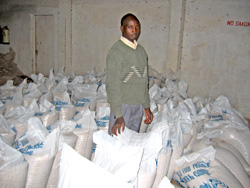You are here » Home » Telling Our Story
Success Story
Grain farmers access credit using warehoused maize as collateral
Banks Open Doors to Farmers

| |
Photo: USAID/Ricky Mugabi
|
|
Sam Arapsatya inspects warehoused maize used as collateral for his first-ever loan in Kapchorwa, Uganda. When the price is right, he can sell the maize and repay the bank.
“With the warehouse receipts system, I was able to get a loan against my grain as security,” said Sam Arapsatya, a Ugandan farmer. “With the money, I bought more seeds and fertilizer. You see, I want to develop my farm.”
|
Like other small-scale commercial farmers around Kapchorwa in eastern Uganda’s maize belt, Sam Arapsatya felt like it was impossible to get ahead financially. Although his 20 acres of rented land had good yields, he struggled to support his large family and keep the farm running from one harvest to the next. Bills piled up during the growing season. When harvest time arrived, Arapsatya would have to sell his maize immediately to village traders to get money for school fees and food, pay farm laborers, and buy the next year’s supplies. Everyone knew the flood of maize onto the market pushed the price down temporarily, but farmers could not afford to store the maize and wait for prices to rise. In addition, although agriculture is Uganda’s main industry, financial institutions and banks traditionally view farmers as too risky for loans — especially if they have no collateral. This made it impossible to get access to the credit that could have changed Arapsatya’s situation.
USAID developed an innovative program with the 2,100-member Kapchorwa Commercial Farmers’ Association to address this situation. Through the program, farmers deliver their crop to a designated secure warehouse, where it is weighed and kept in storage until the farmer is ready to sell. In the meantime, the farmer is issued a certified receipt that can be taken to a local bank and used to secure a loan, with the warehoused grain serving as collateral. The loans can equal up to 80 percent of a harvest’s value. When the farmers sell the grain, they repay the loan. The program also works with the World Food Program, which buys high-quality maize from the warehouse at a higher price than what the farmers get from quick sales to local traders.
“This system rescues us,” Arapsatya explained. “I can instruct the association to sell at a price I am comfortable with and benefit from the highest price.”
The warehouse receipts program — the first in Uganda — has boosted incomes and enabled Kapchorwa farmers to invest in the future. The amount of grain stored in the warehouse has exceeded expectations, and a nearby bank has set aside $200,000 for small agricultural loans. Based on Kapchorwa’s success, similar programs are being developed in other parts of Uganda that will make it easier for farmers to get ahead, rather than just make ends meet.
Print-friendly version of this page (398kb - PDF)
Click here for high-res photo
Back to Top ^ | 

